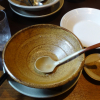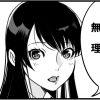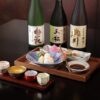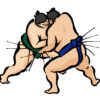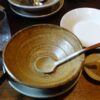What do “bibiru” and “bibitta” mean? What in English? びびる
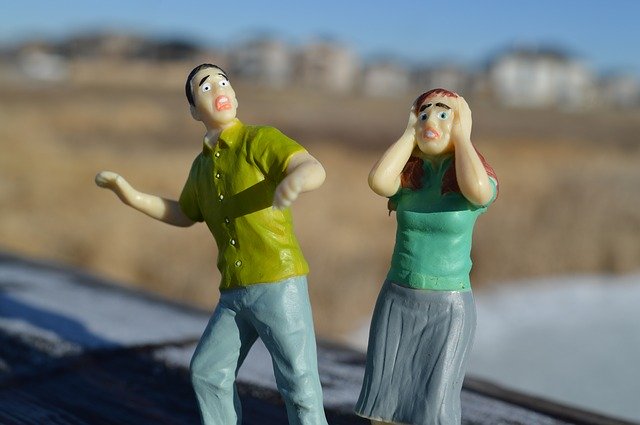
Seebu suru mae ni PC ga furi-zu suru to bibiru yone.
セーブする前にPCがフリーズするとビビるよね。
Are omae no yomesan? Maji kowai, bibiru wa-.
あれお前の嫁さん?マジ怖い。ビビるわ。
Saifu wasureta kato omotta-. Bibitta-.
財布忘れたかと思ったー。ビビったー。
“Bibiru(ビビる、びびる)" is a word that many Japanese may probably feel “slang." Because the word itself sounds like slang and it is mostly used by young people and some adults (mainly men).
But in fact, this is an old word that has been used since the Edo period, and it is also published in old literature.
What do “bibiru" and “bibitta" mean?
“Bibiru" is used in situations where someone is “frightened", “shrinks with fear", “withdrawing", or “feeling hesitant".
For example, when you have escaped safely after a dangerous situation when you meet a terrible person when you are very nervous when you imagine an unfavorable situation or something is more stimulating than expected.
“Bibiru" is the basic verb form, and “bibitta(ビビった)" is its past form.
Origin of “bibiru"
Some people argue that the word “bibi" comes from the words that describe the sound of the earth shaking and the way the object snarls. Others argue that the quakes that often occur in Japan made people in the old times frightened and their such attitude was called “bibiru."
In Japan, when someone is surprised it is often referred to as “bikubiku suru(びくびくする)". Some think that “bibiru" came from this phrase because it resembles the sound of “bibiru".
Because many people have the impression that “bibiru" it s slang as it sounds a modern word in terms of its sound, as mentioned above, but some old literature prove that it has existed since the Edo period.
“Bibi" is an onomatopoeia itself. It is derived from the “biribiri-suru(ビリビリする)", the way the object vibrates. The other word “bikubiku(びくびく、ビクビク)" has the same etymology.
Example sentences using “bibiru"
The following is a sentence example using “bibiru".
Since it is a verb, it also includes examples in altered forms.
Are kurai no saka dewa bibiranai yo.
あれ位の坂ではビビらないよ。
I don’t falter on such a slope.
Sukoshi demo bibireba oiteikukara na.
少しでもビビれば置いていくからな。
If I show any fear, I will leave you.
Nandayo sono hannou. Sukoshi wa bibireyo.
何だよその反応。少しはビビれよ。
What is that reaction. Why don’t you show a little fear?
Aa souda yo, ore wa bibitteru yo.
ああそうだよ、俺はビビってるよ。
Oh yeah, I’m scared.
Kanojo ga shinken na kao wo shiteita node bibitte shimatta.
彼女が真剣な顔をしていたのでビビってしまった。
She had a serious face, which made me frightened.
A: Bibitte nai? Hikikaesou ka?
B: Bibitte nee yo. Ikuzo.
A: ビビってない?引き返そうか?
B: ビビってねぇよ。行くぞ。
A: Arent’ you scared? Shall we go back?
B: I am not. Let’s go.
Ano hito no bibiru soburi nante mitakoto nai.
あの人のビビる素振りなんて見たことない。
I haven’t seen that person’s frightening behavior.
Nani sono bibitta kao. Kowai nara yamero yo.
何そのビビった顔。怖いならやめろよ。
What is that scared face? Just stop doing it if you’ve got cold feet.
Seebu suru mae ni PC ga furi-zu suru to bibiru yone.
セーブする前にPCがフリーズするとビビるよね。
It is frightening when my PC freezes before saving any files.
Are omae no yomesan? Maji kowai, bibiru wa-.
あれお前の嫁さん?マジ怖い。ビビるわ。
Is that your wife? She is kind of strong and scary.
Hikouki ni noriokureu kato omotta–. Bibitta-.
飛行機に乗り遅れるかと思ったー。ビビったー。
I thought I missed the plane. I was close.
Sumimasen, chotto bibiri mashita.
すみません、ちょっとビビりました。(casual and polite)
Sorry, I was a little scared.
Daijoubu desu. Bibitte masen.
大丈夫です。ビビってません。(casual and polite)
I’m okay. I’m not scared.
Kyou, gakkou de tannin no sensei ni shikararete bibitta.
今日、学校で担任の先生に叱られてびびった。
I was panicked as my homeroom teacher told me off at school today.
Souzou shiteita yori ooku no hito no mae de hanasanakereba naranakatta node bibitta.
想像していたより多くの人の前で話さなければならかったのでびびった。
I got cold feet as I had to talk in front of more people than I had imagined.
Ano hito ga okoru to totemo kowai kara, kimi mo kitto bibitu to omou yo.
あの人が怒るととても怖いから、君もきっとビビると思うよ。
I think you will be surprised because that person is so scared to get angry.
Hitomae de bibiranai tame niwa, fudan kara dokyou wo tsukete oku hitsuyou ga aru.
人前でびびらないためには、普段から度胸を付けておく必要がある.
In order to avoid fear in public, it is necessary to have strong nerves on a regular basis.

